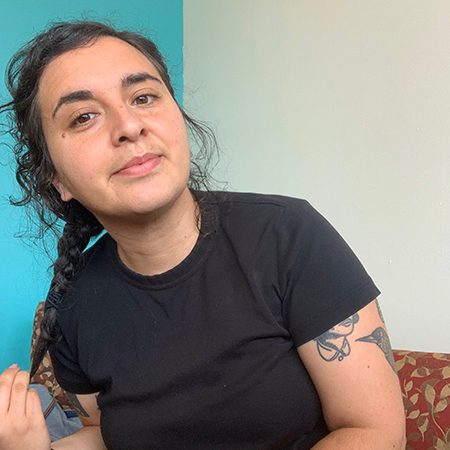We have been experiencing intense heat waves in Philadelphia, unrelenting warmth that doesn’t evaporate even in the darkest hours of the night. Over the years, I have gotten used to the sticky and humid summers, but lately it has felt oppressing. When the heat permeates the early hours of the day, I am transported to mornings in my grandparent’s front yard, a tiled outdoor space with a table covered in a thick plastic tablecloth, lightly dusted with sand. There used to be lemon trees along the edges, and then just tiles.
My grandparents lived in Biˀr as-Sabˁ, currently known as Beer-Sheva within the Zionist Project. A small first floor of a house, a yard on top of a sandy hill wrapped by a iron-wrought gate, in front of the city’s city hall. I fear the sandy hill doesn’t exist anymore, swallowed by constructions. My grandparents are long gone.
But back then I spent part of my summers there, with my mother and my siblings. We’d sleep in the Heder Aravi, their Arab room. An assortment of large rugs and paintings of the desert separated from the rest of the house with a curtain of wooden beads, mementos of a life left in the old country. In the Heder Aravi, the furniture was set up so that an imaginary tea ceremony could happen at a moment’s notice; the center of the room left unused for a fictional group to sit cross-legged and share warm beverages. Nobody used the room for tea drinking. Aside from the occasional guest, the room also hosted an extra fridge, holding large bottles of soda and baskets of stone fruits.
In the mornings we’d drink coffee, made the Turkish way, Nes, or na3na3 tea, the Moroccan way in those glass mugs that are omnipresent in Occupied Palestine. Early, before the desert sun burnt everything, before the shade would disappear and be replaced by blinding light. A tea bag, fresh mint leaves, a healthy dose of sugar. The cooling properties of a plant known for growing rapaciously, preparing us for the ruthless heat of the desert. We’d sit in the coolness of the early morning, around the table covered in a thick plastic tablecloth, lightly dusted with sand.
When I was younger, my grandmother would have baked us dry cookies to dip into our drink. Some covered in sesame, some plain. A hint of orange blossom, maybe. As she grew older, she would outsource that task and buy them from a neighbor. A couple of biscuits, mint leaves, floating in glass cups. Mint leaves in a mug at home, as an act of care for my mother back in Mulhouse. Continue Reading “Thinking about na3na3”

noam keim (they/them) is a trauma worker, medicine maker and flâneur freak currently based on stolen Lenni-Lenape land known as Philadelphia. noam was born a settler of Occupied Palestine in an Arab Jewish family hailing from Morocco before moving to France as a young child. They are a Lambda Literary ’22 Fellow, an RWW ’23 Fellow, a Tin House ’23 Fellow and a Periplus ’23 Fellow mentored by Grace Talusan. Their debut essay collection The Land is Holy won the 2022 Megaphone Prize judged by Hanif Abdurraqib and is expected to be published by Radix Media in 2024. Connect on IG: thelandisholy or thelandisholy.com.